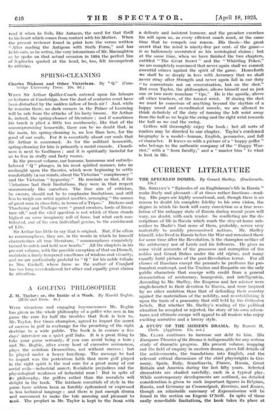A GOLFING PHILOSOPHER
J. H. Taylor; or, the Inside of a Week. By Harold Begbie. (Mills and Boon. 4s.) WITH vivacious and engaging ingenuousness Mr. Begbie has given us the whole philosophy of a golfer who sees in his game the cure for half the troubles that flesh is heir to. Mr. Taylor, five times champion, agreed to impart the secret of success in golf in exchange for the preaching of the right doctrine to a wide public. The book is in essence a five days' interview on a quiet golf links. It is a great thing to take your game seriously, if you can avoid being a bore ; and Mr. Begbie, after every bout of excessive seriousness, plays the sedulous Democritus, not without success ; but he played under a heavy handicap. The message he had to impart was the portentous faith that more golf played in the right spirit is the real cure for a great many of our social evils—industrial unrest, Socialistic prejudices and the physiological weakness of industrial man ! But in spite of its philosophy, the golfers rather than the moralists will delight in the book. The intrinsic essentials of style in the game have seldom been so forcibly epitomised or expressed in less technical language ; and there is just enough drama and movement to make the tale amusing and pleasant to ;cad. The prophet in Mr. Taylor is kept to the front with
a delicate and insistent humour, and the preacher exercises his will upon us, as every efficient coach must, at the same time that he compels our reason. His thesis—the great secret that the mind is ninety-five per cent. of the game— is as ludicrously overstated as his sociological claims ; but at the same time, when we have finished the two chapters, entitled "The Great Secret" and the "Whistling Poker," we are completely convinced that never again shall we commit essential crimes against the spirit of the game. Henceforth we shall be so deeply in love with Accuracy that we shall never stray after Strength and never again fail in our duty "to concentrate not on concentration, but on the shot." But even Taylor, the philosopher, allows himself and us just one or two more mundane tips." He is the apostle, above all other teachers, of the turned wrist. If during the shot we must be conscious of anything beyond the rhythm of a happy mood and co-ordinated muscle, we are allowed to think definitely of the duty of turning the left wrist away from the ball as we begin the swing and the right wrist towards the ball as we end the swing.
Golfers will thoroughly enjoy the book ; but all sorts of
readers may be directed to one chapter. Taylor's condensed
biography is a model—human, English, persuasive, and full of character. It leaves us with a picture of a "happy golfer" who belongs to the authentic company of the "Happy Warrior," with a "born faculty," and a "master bias" to what is best in life.










































 Previous page
Previous page